Overview
Office managers play a vital role in ensuring smooth daily operations, serving as liaisons among departments, and nurturing a positive workplace culture, particularly in the evolving landscape of remote and hybrid work. Their responsibilities have notably expanded to encompass:
- Strategic decision-making
- Financial management
- Implementation of technology
This means that these roles are crucial for enhancing employee engagement and organizational productivity. Furthermore, as the demands of the workplace increase, the effectiveness of office managers becomes even more critical in navigating these challenges.
Introduction
In the ever-evolving landscape of modern business, the role of an office manager has become increasingly vital to organizational success. As the linchpin connecting various departments, office managers not only ensure the smooth operation of daily tasks but also foster a collaborative and engaging workplace culture.
Furthermore, with the rise of remote and hybrid work environments, their responsibilities have expanded to include managing team dynamics and implementing innovative technologies that streamline processes. This means that as organizations face unprecedented challenges, understanding the multifaceted nature of office management is essential for navigating the complexities of today’s corporate world.
This article delves into the key responsibilities, essential skills, and career advancement opportunities for office managers, highlighting their indispensable role in driving productivity and employee satisfaction.
Defining the Role of an Office Manager
A workplace supervisor is a cornerstone in any organization, tasked with the vital responsibility of ensuring seamless daily operations. Acting as a liaison among various departments, they enhance communication and collaboration, which is crucial for fostering a cohesive work environment. The responsibilities of an office manager encompass a broad spectrum, ranging from routine administrative tasks to strategic decision-making, positioning them as indispensable to organizational success.
In 2025, the significance of workplace supervisors has only increased, especially as companies adjust to the changing environment of remote employment. With 64% of U.S. hiring leaders indicating they have the resources to recruit remote workers, supervisors are increasingly tasked with overseeing hybrid teams and ensuring that all personnel feel engaged and valued. This responsibility is particularly significant considering that 79% of staff depart their positions due to feeling undervalued, emphasizing the crucial role of supervisors in fostering a supportive workplace culture.
As mentioned by ActivTrak, "One key reason that staff feel disengaged is that they believe their skills are not being fully utilized," highlighting the importance for supervisors to actively connect with their teams.
Current trends indicate a shift in performance review systems, with 80% of staff expressing a preference for ongoing feedback rather than traditional annual evaluations. This shift positions administrative leaders in a pivotal role, as their responsibilities often include implementing these feedback mechanisms and ensuring that employees feel their skills are being fully utilized, as noted by industry insights.
The responsibilities of office managers in 2025 also involve utilizing technology to improve operational efficiency. As 79% of leaders concur that adopting AI is crucial for sustaining competitiveness, managers must strategically plan for AI implementation within their organizations. This means not only understanding the technology but also ensuring that their teams are prepared to adapt to these changes, as indicated by the need for strategic planning in AI implementation to leverage its benefits.
Case studies demonstrate the transformative effect of effective workplace administration. Organizations that prioritize strong workplace management practices report improved employee satisfaction and productivity, demonstrating that the role is not merely administrative but integral to the overall health of the business. In summary, the administrator's role is evolving, becoming more strategic and essential in navigating the complexities of modern business operations.
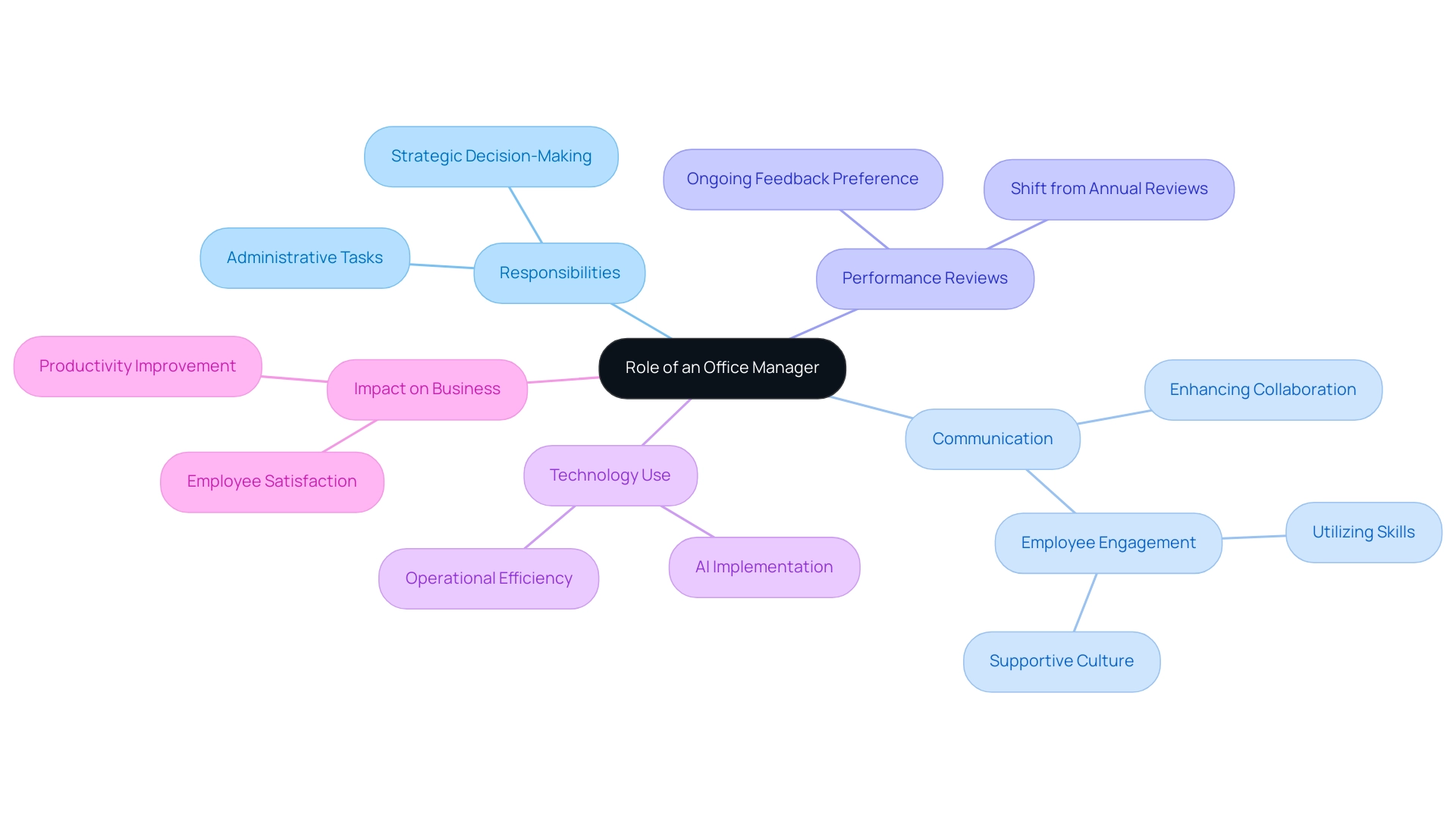
Key Responsibilities of an Office Manager
Office supervisors manage crucial responsibilities that significantly contribute to the smooth operation of organizations, handling a diverse array of tasks essential for maintaining efficiency and productivity. Key tasks include:
- Administrative Oversight: This involves managing supplies, scheduling meetings, and maintaining organized filing systems. Effective administrative oversight ensures that the workplace operates smoothly and that employees have the resources they require to perform their tasks efficiently.
- Financial Management: Office supervisors oversee budgets, process invoices, and ensure that financial records are accurate. In 2025, best practices in finance emphasize the importance of data-driven decision-making, with organizations that adopt such strategies being three times more likely to achieve their business objectives. Kulud's automated expense management solution significantly assists administrators in streamlining financial tasks, such as automated invoice processing and secure data handling, allowing them to focus on strategic decision-making while ensuring data security and compliance. Kulud utilizes advanced encryption to safeguard sensitive financial information and has effectively completed a Cloud Application Security Assessment (CASA), confirming its security protocols and adherence to industry standards.
- Human Resources Functions: Assisting with recruitment, onboarding, and staff relations are included in the office supervisor responsibilities. With 40% of workers viewing professional development and mental health programs as essential advantages, supervisors must promote and enact initiatives that foster staff well-being and growth. Notably, 47% of staff encountering workplace disputes opt not to tackle issues formally, highlighting the importance of conflict resolution strategies that supervisors can support. Implementing comprehensive support programs can attract and retain talent, which is crucial in today's competitive landscape.
Ensuring that the work environment is safe, functional, and conducive to productivity falls under office supervisor responsibilities. This involves routine evaluations of the workspace and implementing necessary changes to improve staff comfort and efficiency.
- Communication Facilitation: Among the office supervisor responsibilities is serving as a liaison between departments to ensure that information circulates seamlessly throughout the organization. This role is particularly important in a landscape where 24.3% of the workforce is hybrid or fully remote, projected to rise to 27.5% by 2028. Effective communication strategies are essential for maintaining cohesion and collaboration among team members, regardless of their physical location. Supervisors must adjust their communication techniques to accommodate these changes, ensuring that all staff feel connected and informed.
In 2025, the average salary for supervisors reflects the increasing complexity and significance of their role, with competitive compensation packages being essential to attract skilled professionals. As organizations continue to progress, the duties of administrative professionals will adjust, necessitating them to remain knowledgeable about industry trends and best practices to effectively assist their teams. Kulud stands out as the ultimate automated expense management solution for freelancers and small business owners, streamlining bookkeeping through features like automated categorization, enhancing security, and facilitating tax preparation.
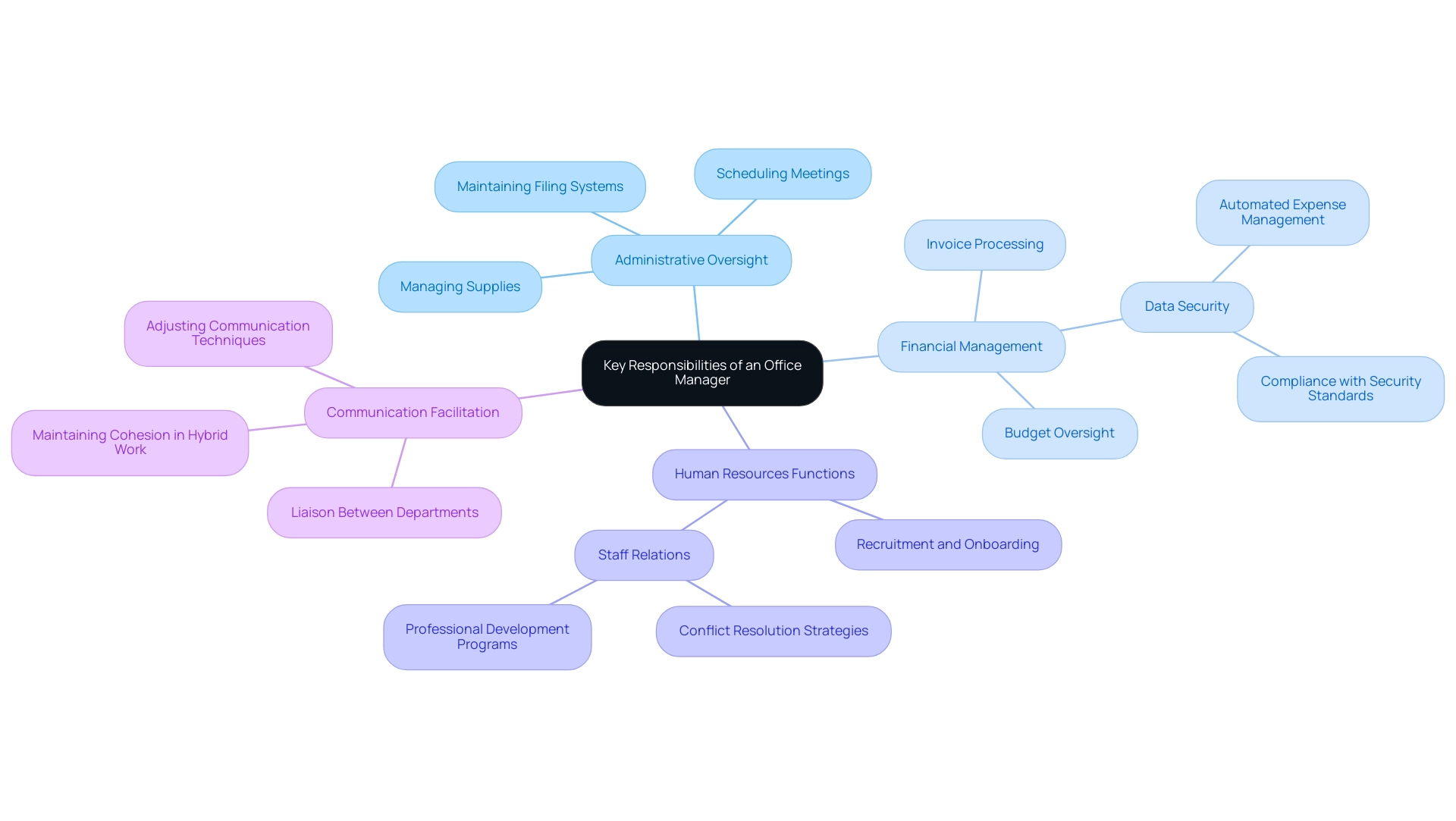
Essential Skills and Qualifications for Office Managers
To excel as an office supervisor in 2025, individuals must cultivate a diverse skill set that aligns with the evolving demands of the workplace. The most sought-after qualifications and essential skills include:
- Organizational Skills: Mastery in managing multiple tasks and prioritizing effectively is crucial. Office supervisors must navigate a variety of office manager responsibilities to ensure that operations run smoothly and deadlines are met.
- Communication Skills: Strong verbal and written communication abilities are vital for facilitating collaboration among team members and stakeholders. In fact, 92% of talent professionals and hiring authorities emphasize the increasing importance of candidates with robust soft skills, particularly in communication. As Cesar Zulaica notes, "Effective communication is the backbone of successful management in the workplace."
- Problem-Solving Skills: The capability to swiftly address challenges and implement effective solutions is essential. Office supervisors often face unexpected issues that require quick thinking and decisive action.
- Technical Proficiency: Familiarity with workplace software and tools is necessary for efficient operations. As technology continues to advance, staying updated on the latest tools can significantly enhance productivity.
- Leadership Qualities: The ability to motivate and guide team members towards common goals is paramount. Leadership soft skills, including verbal communication and teamwork, are considered the most important for leaders today.
Qualifications typically include a degree in business administration or a related field, complemented by relevant experience in administrative roles. Case studies have demonstrated that organizations investing in learning and development, especially through microlearning methods, experience enhanced productivity and knowledge retention among staff. Microlearning, which involves short, targeted training modules, fits seamlessly into daily routines and has been linked to higher engagement and skill acquisition.
In summary, the environment for administrative professionals in 2025 requires a combination of organizational acumen, communication prowess, problem-solving capabilities, technical skills, strong leadership qualities, and an understanding of office manager responsibilities. By concentrating on these vital abilities and credentials, aspiring administrators can prepare themselves for success in a competitive job market. Moreover, metrics on internal promotions and leadership skills development highlight the significance of investing in learning and development for administrative personnel, ensuring they are well-prepared to tackle future challenges.
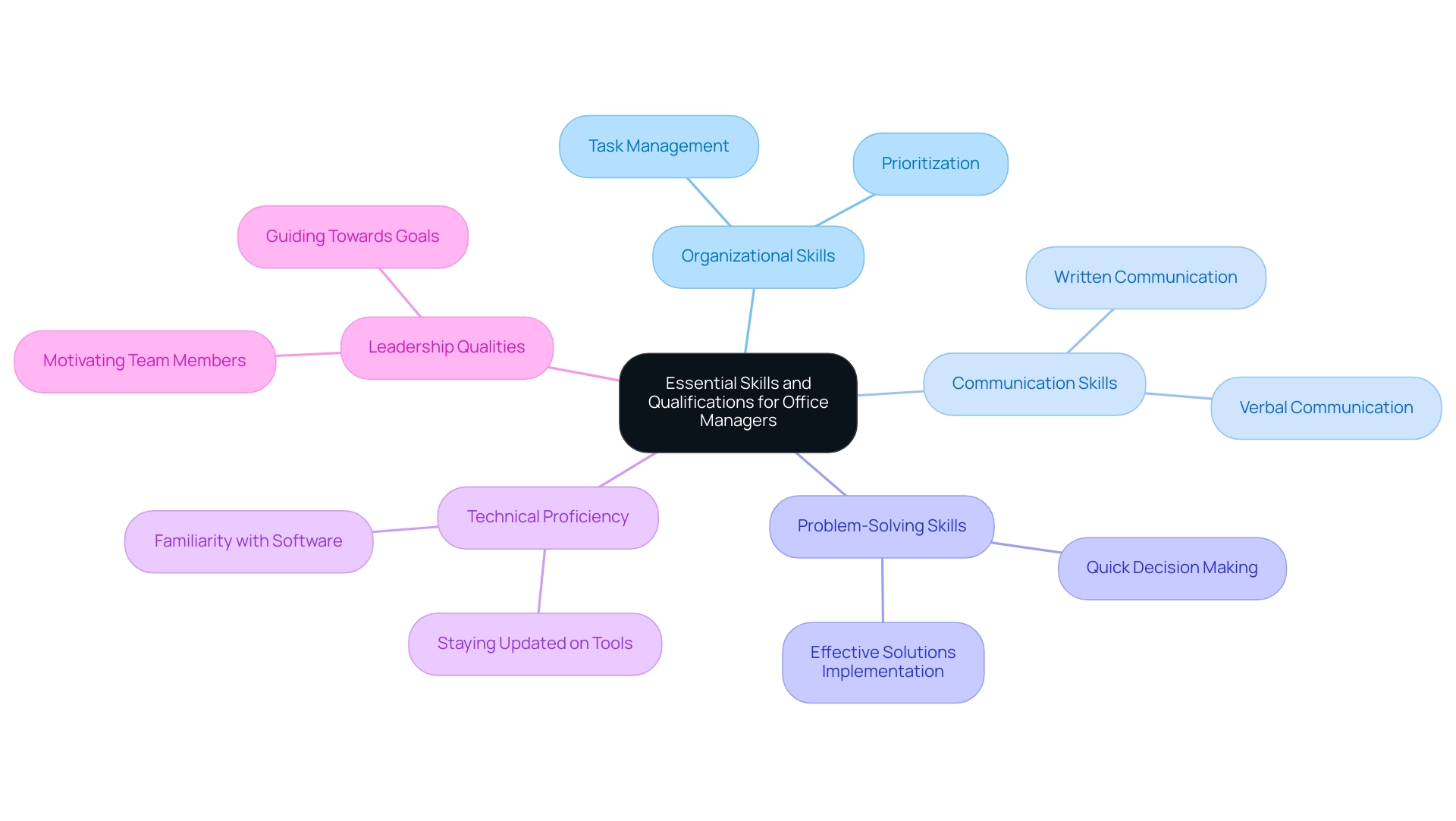
A Day in the Life of an Office Manager
A typical day for an administrative supervisor in 2025 is organized yet dynamic, reflecting the multifaceted nature of the role. The morning routine often begins with logging in with a business email, supported by Gmail, to check emails and prioritize tasks for meetings, ensuring that the day starts with clarity and focus. This initial phase is crucial, as effective email organization can significantly influence productivity levels throughout the day.
As the day progresses into midday tasks, the office manager responsibilities include:
- Coordinating with team members
- Managing supplies
- Addressing any urgent issues that arise
This collaborative effort not only fosters a cohesive work environment but also enhances operational efficiency. Incorporating tools like Kulud can streamline expense management by automating receipt capture and matching invoices with bank transactions, alleviating the burden of manual sorting.
Statistics indicate that organizations leveraging data-driven strategies experience 23% higher profitability, underscoring the importance of informed decision-making in daily operations.
In the afternoon, duties shift towards:
- Reviewing financial reports
- Conducting staff meetings
- Planning for upcoming projects
This time is essential for aligning team goals with organizational objectives, as companies that effectively utilize performance data achieve 40% higher employee satisfaction rates. By using Kulud’s features, administrators can easily export financial data for VAT or annual reports, ensuring accuracy and saving time.
Such insights are vital for fostering a motivated workforce and ensuring that all team members are engaged and productive. As Maria Stylianou, an HR Business Partner, observes, "ThriveSparrow has streamlined our survey process, automating engagement assessments and workplace feedback while reducing manual effort and errors," emphasizing the advantages of automation in improving workplace processes.
As the day winds down, supervisors reflect on the day's accomplishments, prepare for the next day, and ensure all tasks are completed. This end-of-day routine not only helps with time organization but also prepares for a successful start the next morning. With Kulud's automated solutions, office manager responsibilities such as handling invoice and receipt processing can be efficiently managed, significantly reducing operational costs and improving overall productivity.
For instance, organizations utilizing data analytics in performance evaluation are 1.5 times more likely to outperform competitors across key business metrics, showcasing the tangible benefits of data-driven approaches.
Furthermore, the performance oversight software sector is anticipated to attain $12.17 billion by 2032, with cloud-based solutions expected to secure 65% market share by 2025. This growth highlights the importance of technology, such as Kulud, in contemporary workplace practices.
In summary, the daily routine of an administrative supervisor is a blend of strategic planning, team coordination, and reflective practices, all aimed at enhancing organizational performance and employee satisfaction, further improved by automated tools that simplify financial processes. With features such as automatic search capabilities and seamless bank account connections for matching invoices with transactions, Kulud provides a comprehensive solution tailored for today's management needs.
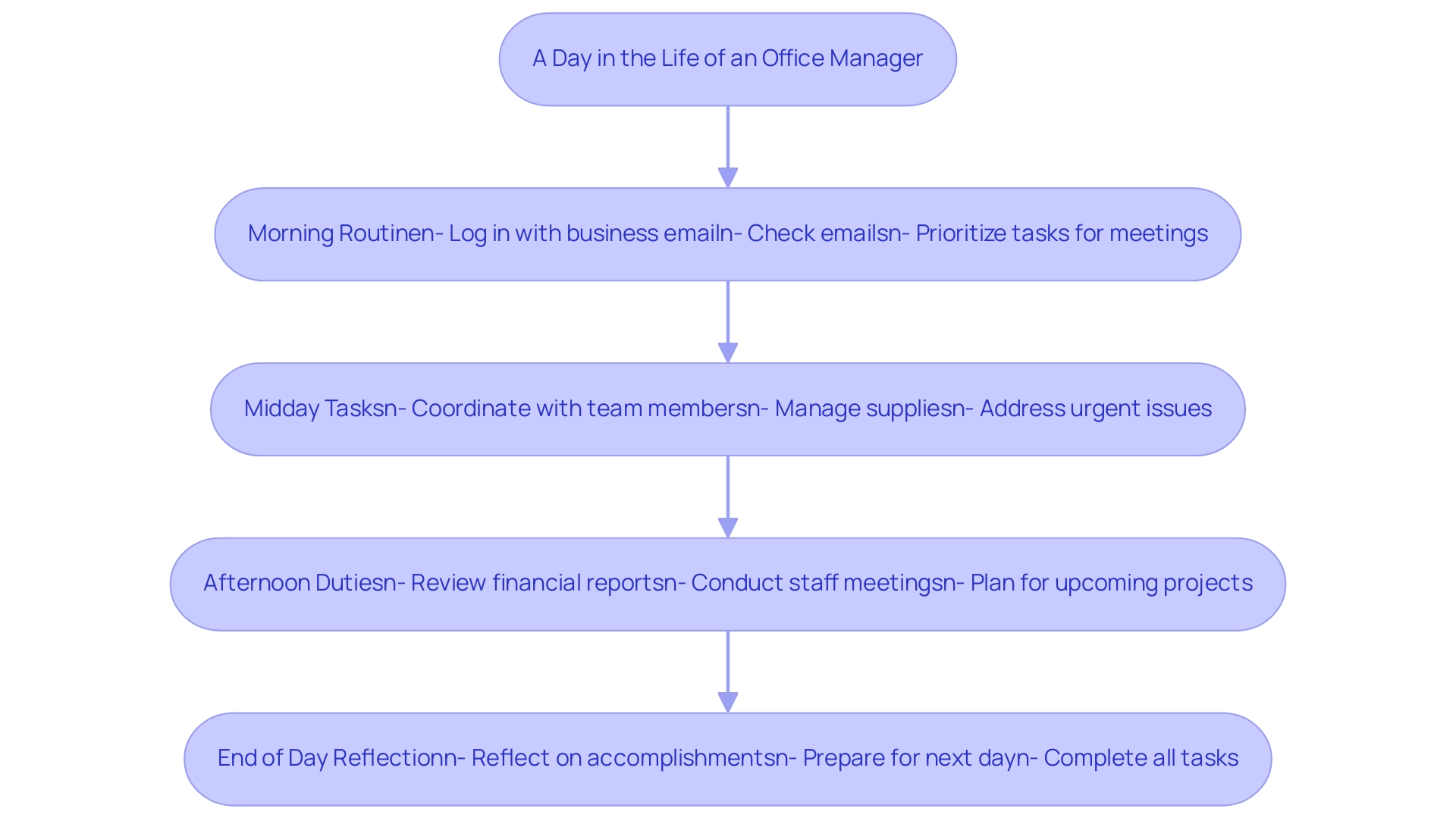
Career Path and Advancement Opportunities for Office Managers
Office supervisors have a multitude of avenues for career advancement, significantly enhancing their professional trajectory. Key paths include:
- Senior Management Roles: Many office managers transition into higher-level positions such as Operations Manager or Director of Administration. This progression often involves taking on greater office manager responsibilities and leading larger teams, which can be both challenging and rewarding.
- Specialization: Office supervisors can choose to specialize in specific areas such as HR management, financial oversight, or project management. This focus not only deepens their expertise but also makes them invaluable assets to their organizations.
- Entrepreneurship: Equipped with their varied skill set, some administrative professionals choose to launch their own enterprises or consultancy services. This entrepreneurial path allows them to leverage their experience in a new and potentially lucrative direction.
Continuous professional development is crucial for enhancing advancement prospects related to office manager responsibilities. Participating in certifications and training programs can provide administrative professionals with the latest skills and knowledge, enhancing their competitiveness in the job market. In fact, research indicates that companies with strong performance oversight practices are 4.2 times more likely to outperform their competitors, highlighting the value of effective leadership skills.
As of 2025, statistics indicate that a substantial portion of administrative leaders are transitioning into senior positions, reflecting the increasing acknowledgment of their contributions to organizational success. Moreover, organizations that establish regular feedback systems attain 40% greater employee engagement rates, underscoring the significance of effective communication and performance oversight in career advancement.
Success narratives are plentiful, with numerous workplace leaders effectively ascending the corporate hierarchy and assuming senior positions. These narratives serve as inspiration for those looking to advance their careers, demonstrating that with the right skills and dedication, significant career growth is achievable. As Lorelei Trisca, Content Marketing Manager, notes, "Workers are looking for a purpose behind their work, which keeps them motivated and increases job satisfaction. Eight in ten workers say learning adds purpose to their work." This sentiment resonates with freelancers as well, who can benefit from similar motivations in their career paths.
Furthermore, with 95% of businesses struggling with data organization challenges, the significance of effective skills becomes even more pronounced. Freelancers can adopt these skills to enhance their own business practices, ensuring they remain competitive in a challenging landscape. The case study titled "Impact of Effective Performance Management on Business Outcomes" further illustrates that organizations with strong performance management systems experience substantial advantages, reinforcing the significance of career development for both workplace leaders and freelancers alike.
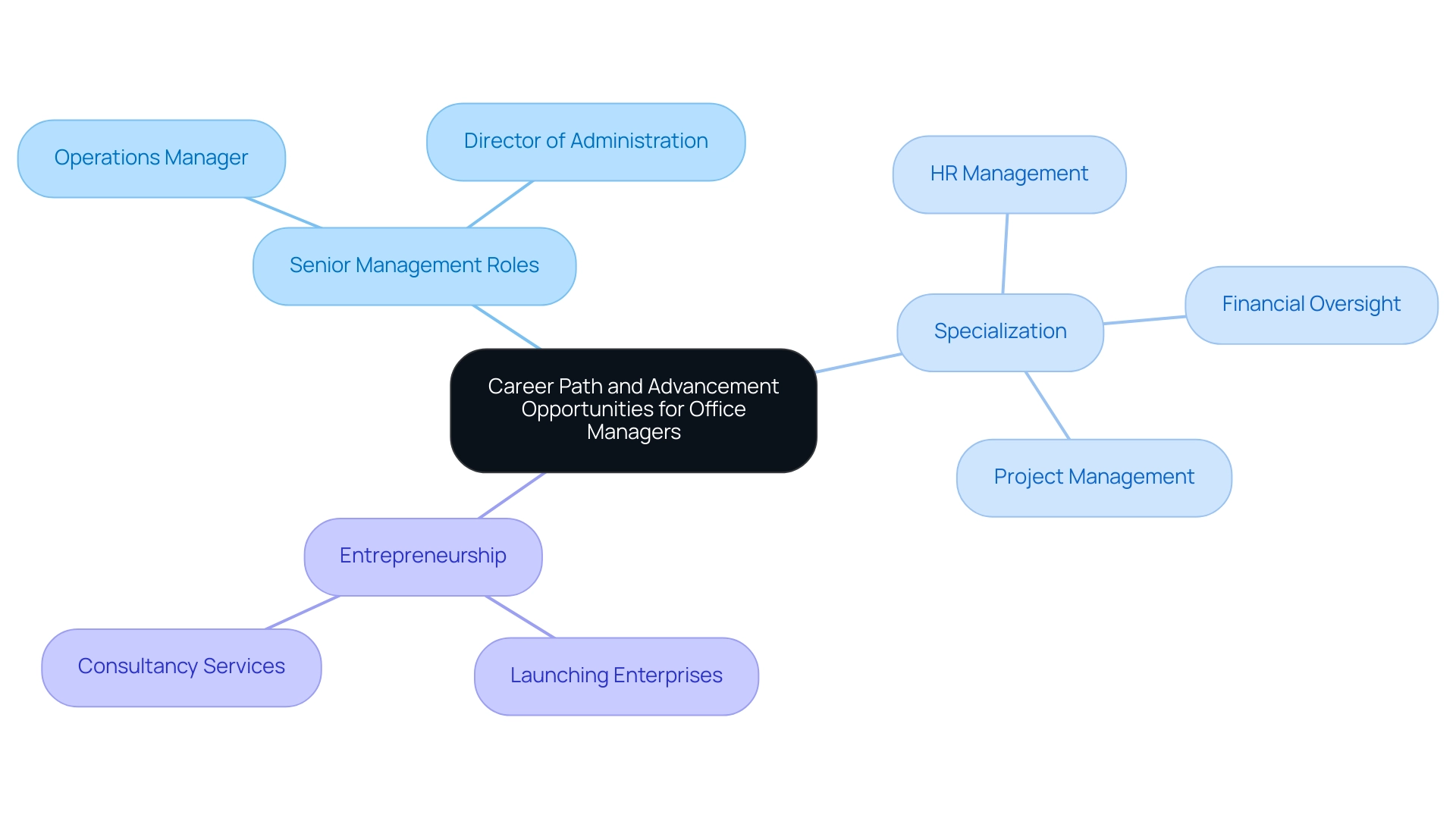
The Indispensable Role of Office Managers in Organizations
Office managers play an indispensable role in organizations by enhancing productivity, fostering communication, and driving strategic goals.
They streamline processes and ensure that operations run smoothly, which is crucial in a landscape where only 23% of leaders have recently upgraded their tech stack. By utilizing automation and AI-driven insights, supervisors can significantly enhance workforce productivity. As Maria Stylianou, HR Business Partner, states, "ThriveSparrow has streamlined our survey process, automating engagement assessments and workplace feedback while reducing manual effort and errors." This aligns with the growing trend towards continuous feedback systems that have shown to increase staff engagement rates by 40% and performance outcomes by 26%.
In addition to enhancing productivity, office managers serve as a central point for information flow, which enhances collaboration across teams. Their ability to facilitate effective communication is vital for maintaining a cohesive work environment, especially as organizations increasingly rely on data analytics to inform decision-making.
Supporting employee well-being through fostering a positive work atmosphere is one of the key responsibilities of office managers, as it enhances morale and engagement among staff. Their efforts in promoting well-being are essential, as studies indicate that a supportive workplace can lead to improved productivity and lower turnover rates.
Furthermore, office managers align administrative functions with the organization's objectives, ensuring that all responsibilities contribute to overall success. This strategic alignment is critical in a time when investing in technology and upskilling workers is essential for future productivity growth.
Case studies illustrate how office manager responsibilities can have a transformative impact on productivity. For instance, organizations that have embraced technology and automation report significant time savings for their staff, allowing them to focus on higher-value tasks. The case study titled "Technology's Role in Enhancing Productivity" highlights that while automation can save employees significant time weekly, only a small percentage of organizations have integrated AI into their operations.
Moreover, expert opinions emphasize that effective office managers not only enhance operational efficiency but also play a crucial role in fostering a culture of continuous improvement and engagement within the workforce, which is particularly relevant for freelancers navigating their productivity challenges.
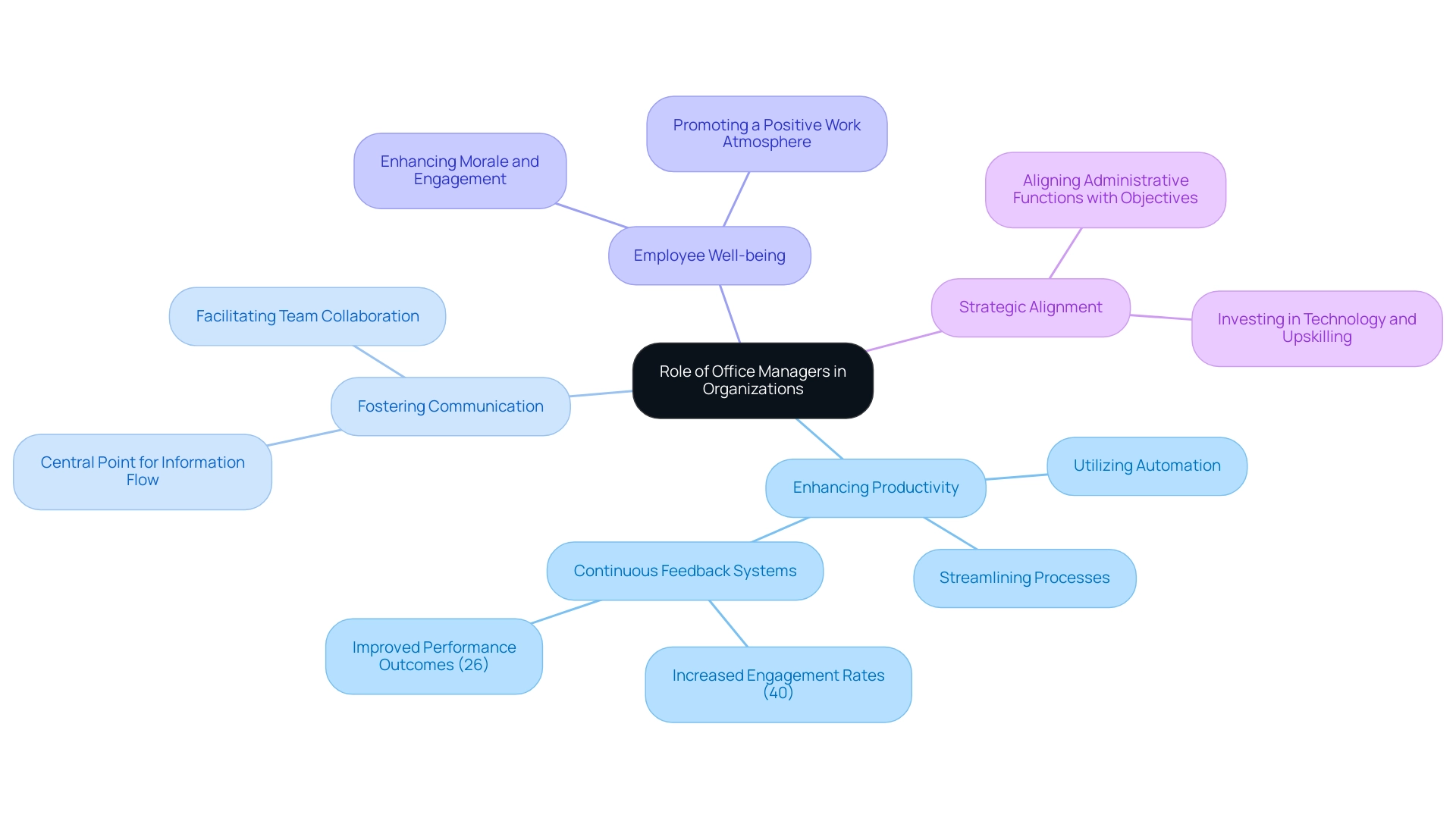
Conclusion
The multifaceted role of office managers is increasingly critical in today’s dynamic business environment. From enhancing communication and collaboration among teams to implementing innovative technologies, office managers are pivotal in driving organizational success. Their responsibilities span administrative oversight, financial management, and human resources functions, all of which are essential for maintaining productivity and employee satisfaction.
As organizations navigate the complexities of hybrid and remote work models, the skills required for office managers have evolved. Mastery in organizational abilities, communication, problem-solving, and technical proficiency is now indispensable. By investing in continuous professional development, aspiring office managers can position themselves for growth and advancement, whether through senior management roles, specialization, or even entrepreneurship.
The importance of effective office management cannot be overstated. By fostering a supportive workplace culture and aligning daily operations with strategic goals, office managers not only enhance productivity but also contribute significantly to employee well-being. As businesses face ongoing challenges and transformations, the role of office managers will continue to be a cornerstone of organizational resilience and success. Embracing this evolution will ensure that office managers remain integral to shaping the future of work, driving both operational excellence and a thriving workplace culture.



